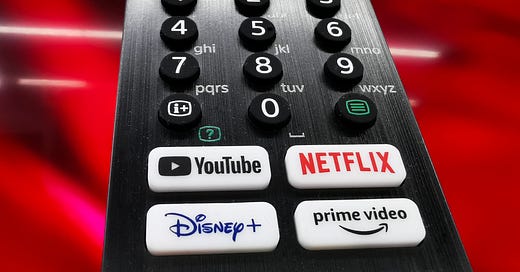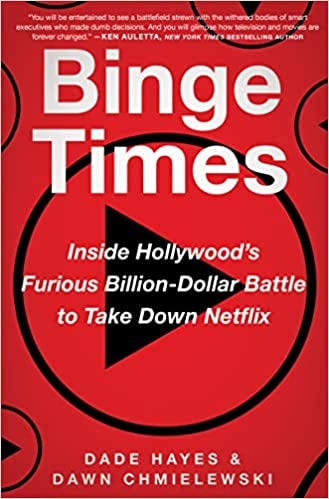Follow us (and like us!) at Apple Podcasts or wherever you listen to your favorite podcasts, and follow us on Twitter. Also please subscribe to The Ankler at TheAnkler.com for more podcasts and stories like these about the entertainment industry.
Today’s Ankler Hot Seat podcast is hosted by Tatiana Siegel and welcomes guest Dawn Chmielewski, a Los Angeles-based entertainment business correspondent for Reuters and co-author of Binge Times: Inside Hollywood’s Furious Billion-Dollar Battle to Take Down Netflix.
Chmielewski, who co-wrote the book with Deadline’s Dade Hayes, answers Hollywood’s most pressing question du jour: Can Netflix, the industry’s original disruptor, be disrupted? Where is streaming’s growth now that it’s sputtering domestically? And who is doing it right?
“We have some early and promising prospects,” Chmielewski tells The Ankler Hot Seat podcast. “The Walt Disney Company has been the most successful of the new entrants here. It decided back in 2019 that it would throw all of its resources behind this successful launch of the Disney+ streaming service. And as you recall, in its first year, it grew well beyond even the company's own forecasts.”
Chmielewski points out two new battlefronts in the streaming wars: India and local content.
“India is a huge populous market, where [Netflix is], by the way, not the leading streaming service. They have intense competition with Disney, which acquired Fox and along with it, its Hotstar, which has sports [and] is incredibly appealing in that market,” she says. “Netflix is actually playing catch-up but investing in a lot of local-language content.”
The bigger challenge for Netflix and others is finding a way to offer a streaming product that is competitive with cable TV, which costs $3 a month in India.
While a new gold rush is afoot in India, China, by contrast, appears to be a dead-end for streamers, particularly Netflix.
“[Netflix] certainly [has] made it clear that they're not attempting to enter China, which is a billion-person-plus hole in their potential market,” she explains. “[But] opportunity exists outside the U.S. And there are some advantages to companies like Netflix going into Korea and developing a series like Squid Game that not only helps it acquire subscribers throughout Asia, but it has been a global phenomenon. And there's the benefit of leaving the U.S. to do production in a place where the production costs are lower. So there is…reaching new audiences with stories that resonate, but also creating novel content that will travel the world. Netflix has clearly laid out the template, and all the other streamers are quickly following.”
Disney, for one, announced that it had appointed a new executive to oversee the development of local content. "That's a big departure for Disney, which, for generations has been exporting its animation [and] live action to the world [and] now it's going to begin to pursue local stories.”
Has all the competition for streaming growth come at a cost? Just one example is Disney’s alienation of CAA, even if for a brief period.
“Having Bryan Lourd, one of the most powerful agents in town, criticizing arguably the most powerful studio in Hollywood was a move we've never seen play out [before],” she adds. “Lourd defended Scarlett Johansson by saying that Disney's strategy to try to grow its subscription service had come at the expense of her paycheck. And the fact that Disney clapped back at her for being insensitive to the pandemic, it was an unprecedented series of events. And I think it furthered the narrative about [Disney CEO] Bob Chapek not being as deft with talent and talent relations as his predecessor, Bob Iger. So I would argue that that was that was a damaging episode…Bob Chapek is still learning on the job.”
Also, the Los Angeles Times alum breaks down the $43 billion mashup of WarnerMedia into Discovery, which closed last week, and how it marks the dawn of a streaming era. Warner Bros. Discovery is now one of the largest pure media companies in the world and a worthy rival of Netflix and Disney+. As a result, the wild spending days may be behind Netflix (think, sob, barebones Oscar parties). She notes of the streaming giant’s reliance on Wall Street approval, “These are consequences of those promises to the street.”
Binge Times hits bookstores tomorrow, April 19.
New on The Ankler:
On The Transom: Momoa + Minecraft and is 'Blair Witch' Back?
The Glossy looks at Johnny Depp, Will Smith and Fashion's "Morals Clause" Pause.
Will NFT’s save Hollywood? Entertainment Strategy Guy looks at the industry’s next would be savior.
An entire industry’s love/hate psychosis arout Netflix.
Spotify’s Top Dealmaker to Depart: news first broken here.
Subscribe to The Optionist
This week: Finding T. Rex + 7 Great Picks
Q&A: Cons are In, Bleak is Out: With projects all over town, Truly Adventurous is changing the journalism x Hollywood playbook

















Share this post